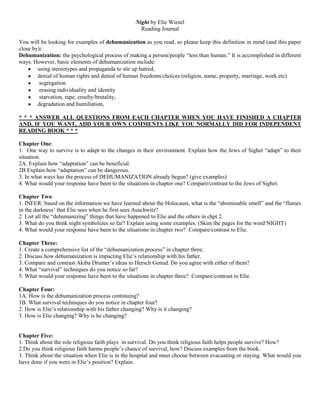Night Reading Log 2009
- 1. Night by Elie WieselReading JournalYou will be looking for examples of dehumanization as you read, so please keep this definition in mind (and this paper close by): Dehumanization: the psychological process of making a person/people “less than human.” It is accomplished in different ways. However, basic elements of dehumanization include: using stereotypes and propaganda to stir up hatred, denial of human rights and denial of human freedoms/choices (religion, name, property, marriage, work etc) segregation erasing individuality and identity starvation, rape, cruelty/brutality, degradation and humiliation, * * * ANSWER ALL QUESTIONS FROM EACH CHAPTER WHEN YOU HAVE FINISHED A CHAPTER AND, IF YOU WANT, ADD YOUR OWN COMMENTS LIKE YOU NORMALLY DID FOR INDEPENDENT READING BOOK * * * Chapter One: 1. One way to survive is to adapt to the changes in their environment. Explain how the Jews of Sighet “adapt” to their situation.2A. Explain how “adaptation” can be beneficial. 2B Explain how “adaptation” can be dangerous.3. In what ways has the process of DEHUMANIZATION already begun? (give examples)4. What would your response have been to the situations in chapter one? Compare/contrast to the Jews of Sighet.Chapter Two: 1. INFER: based on the information we have learned about the Holocaust, what is the “abominable smell” and the “flames in the darkness’ that Elie sees when he first sees Auschwitz?2. List all the “dehumanizing” things that have happened to Elie and the others in chpt 2. 3. What do you think night symbolizes so far? Explain using some examples. (Skim the pages for the word NIGHT)4. What would your response have been to the situations in chapter two? Compare/contrast to Elie.Chapter Three:1. Create a comprehensive list of the “dehumanization process” in chapter three.2. Discuss how dehumanization is impacting Elie’s relationship with his father.3. Compare and contrast Akiba Drumer’s ideas to Hersch Genud. Do you agree with either of them?4. What “survival” techniques do you notice so far?5. What would your response have been to the situations in chapter three? Compare/contrast to Elie.Chapter Four: 1A. How is the dehumanization process continuing? 1B. What survival techniques do you notice in chapter four?2. How is Elie’s relationship with his father changing? Why is it changing?3. How is Elie changing? Why is he changing?Chapter Five: 1. Think about the role religious faith plays in survival. Do you think religious faith helps people survive? How? 2.Do you think religious faith harms people’s chance of survival, how? Discuss examples from the book.3. Think about the situation when Elie is in the hospital and must choose between evacuating or staying. What would you have done if you were in Elie’s position? Explain.Chapter Six: 1. At this point, what physical condition do you imagine the prisoners are in?2. How do these physical issues probably impact their thinking and emotional state?Chapter Seven:1. What do the German workmen do when the train stops?2. Why do they do this?3. What is ironic about Elie’s memory of the woman who liked “to give to charity”?4. What happens between “Meir” and his father?5. Where does the train take Elie and his father?Chapter Eight:1. What would you have done if you were Elie in this chapter?2. What do you think about Elie’s confession that he probably felt “free” when his father died? What has caused this change in Elie?Chapter Nine: 1. How has starvation dehumanized Elie at this point?2. After the liberation, Elie almost dies of food poisoning. What is ironic about this?3. How does Elie describe himself when he looks in the mirror?4. What is significant about his shift in point of view (first person (I) to third (he) )? What is significant about the way Elie describes his reflection and how it impacts him still?When you are done with the book choose 2-4 ideas/questions from under the theme section of this paper. Make sure to tell which numbers you have chosenTHEMES: ideas/questions to keep in mind as you read What does Elie lose and gain throughout his experience?How do people survive in difficult and deadly circumstances?What does the word/time “Night” symbolize (represent)?How does Elie’s relationship with his father change throughout the novel? What causes these changes?What roles do religion and faith play in Elie’s life and his survival? How does his relationship with God change and what causes this change?Look for passages (sections) of each chapter that seem important or have an impact on you in some way.Think about WHY Elie chose to relive these terrifying memories and write a book.

